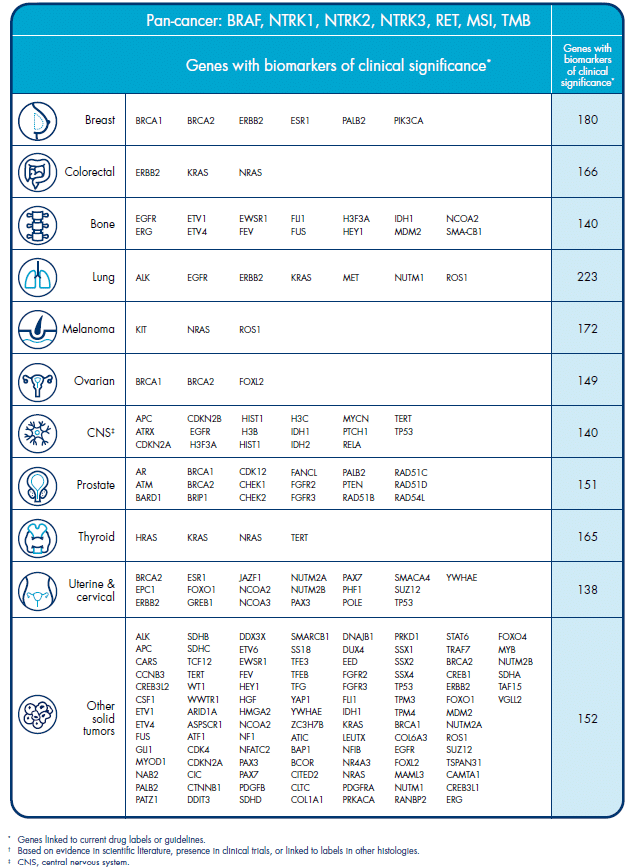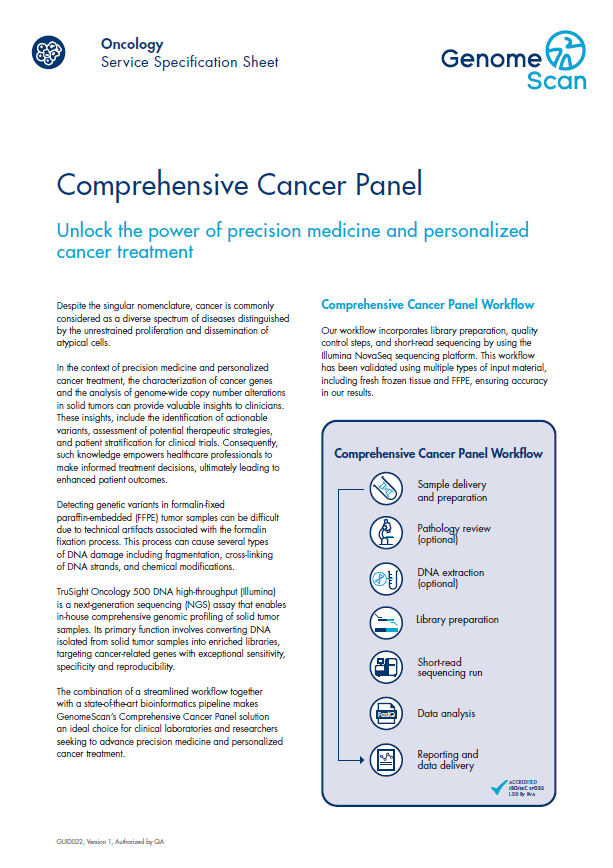Comprehensive Cancer Panel for Tumor Profiling
Cancer is a complex disease characterized by uncontrolled cell growth and the accumulation of genetic alterations. Understanding the genomic landscape of tumors is crucial for accurate diagnosis, treatment selection, and monitoring of cancer patients. In the quest to unravel the complex genetic landscape of cancer, a breakthrough technology has emerged: the Comprehensive Cancer Panel.
This advanced genomic tool provides an all-encompassing approach to tumor profiling, offering a comprehensive analysis of genetic alterations implicated in various cancer types. It has advantages over individual biomarker assays in its ability to detect multiple biomarkers with one test, saving time, money and samples. The comprehensive cancer panel employs next-generation sequencing (NGS) to target 523 genes in different tumor types. Not only does this assay identify all relevant variants (SNVs, insertions, deletions and CNVs) across various tumor types, but it also reports tumor mutational burden (TMB) and microsatellite instability (MSI) scores.
The design of a comprehensive cancer panel is a meticulous process that involves the selection of genes and genomic regions crucial to underlying biology of cancer, such as critical biomarkers with known cancer associations as indicated in drug labels, European Society for Medical Oncology (ESMO) recommendations, and information shared on clinical trials for solid tumor types. The panel cover a wide range of oncogenes, tumor suppressor genes, DNA repair genes, and other key elements implicated in cancer development and progression, offering comprehensive genomic profiling across various malignancies, including solid tumor (breast, lung, bone, colorectal, prostate, ovarian, and pancreatic cancer), neurological tumors (CNS cancer), genitourinary tumors (kidney and bladder cancer), skin cancers (melanoma), and others (Table 1).
Advantages of the comprehensive cancer panel
The workflow of comprehensive profiling
The workflow of comprehensive cancer panel analysis involves several key steps. Initially, tumor tissue is collected from the patient through a biopsy or surgical procedure. If requested, the biopsy sample undergoes a pathology to determine the tumor cell percentage before DNA extraction, healthcare professionals can better tailor genetic testing approaches and make more informed decisions regarding patient treatment and management. Genetic material (DNA) is extracted from the tumor tissue and proceed to library preparation. This involves DNA fragmentation, attaching molecular tags, and preparation for sequencing. The libraries are subjected to NGS using cutting-edge sequencing platforms, such as Illumina, generating vast amounts of sequencing data. Advanced bioinformatics pipelines are employed to process and analyze the data, identifying genetic alterations within the targeted genomic regions. Annotation databases and bioinformatics tools aid in interpreting the detected alterations, providing crucial insights into potential driver mutations, therapeutic targets, and prognostic markers (Figure 1).

Figure 1. Comprehensive Cancer Panel workflow.
In conclusion, the comprehensive cancer panels are revolutionizing the field of cancer diagnostics, ushering in an era of precision medicine. The genetic profiling of tumors empowers clinicians to unravel the distinct genetic composition of each patient’s cancer, thereby paving the way for tailored treatment strategies. This innovative approach not only permits the identification of precise therapeutic options but also offers the opportunity to match patients with targeted therapies and clinical trials tailored to the specific genetic aberrations detected in their tumors. By aligning treatment choices with the unique genetic makeup of each cancer, this paradigm shift significantly amplifies the prospects of treatment efficacy and elevates patient outcomes to new heights.
Service specifications
We have summarized key information about our Comprehensive Cancer Panel solution into a service specification sheet. You can download this by clicking on the image.
Let’s connect!
dr. Stefanie Klaver-Flores, our Head of Oncology is ready to support your workflows with our oncology solutions. You can reach out to her by sending email to oncology@genomescan.nl

About GenomeScan
GenomeScan is a leading provider in the context of Unveiling the Genetic Landscape of Cancer. With our state-of-the-art technologies, we provide a deep and detailed analysis of the genetic landscape underlying various cancer types, targeting genes and genomic regions known to be associated with cancer development and progression, ensuring a thorough assessment of the tumor genome. Leveraging state-of-the-art next-generation sequencing technologies and advanced bioinformatics analysis, we uncover critical genetic alterations, including mutations, copy number variations, and structural variants. With a focus on accuracy, reliability, and personalized support, GenomeScan empowers researchers and clinicians to make informed decisions in diagnosis, treatment selection, and patient management, ultimately driving advancements in precision oncology.







